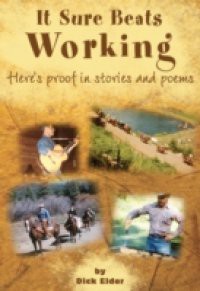Since Dick Elder published Which Way is West in 2002, people have encouraged him to write a sequel about Colorado Trails Ranch, the dude ranch he built and ran for close to forty years. Elder used to entertain with stories and anecdotes about people who came to or worked at Colorado Trails. He kept writing poetry, which often elicited comments such as, "You know, you should put your poems in a book." Elder worked on a number of movies. All kinds of interesting and amusing things happened while he was on location and people said, "You know, you should tell some of those movie stories in a book." Bottom line, he resisted every one of those suggestions, until recently and with a unique personal twist - It Sure Beats Working. During nearly forty years at Colorado Trails, Elder met some incredible people. The personalities of the guests and staff ran the entire array of social and physiological behavior. The short stories in Part 1 illustrate and expose the humor and diversity that filled his life for forty years. Part 2 is comprised of stories about some of the more "off the wall" funny, strange and interesting things that happened while he was working on movie sets. After the first movie in 1971, in which he trained one of the lead actors to ride, he worked as the Humane Officer for the American Humane Association. The American Humane Association (AHA) established the Film Unit in 1940. It is the leading authority on the safe use of animals in film. As a small child Elder's dad recited poetry-some from well-known authors and some of his own invention. His remarkable older brother, who enjoyed writing poems and learning the soliloquies of Shakespearian characters, insisted he too become a devotee of this art form and thus he was pushed to memorize and recite the Hamlet soliloquies. Later on when he was working cattle in the high country of southwest Colorado, he'd tie his reins around the saddle horn, open a book and work at memorizing the poems and soliloquies he hadn't mastered as a child. He's been writing poems since his high school days, frequently for birthdays, anniversaries, special occasions, holidays and for Cowboy Poetry gatherings. You can skip the poems in Part 3 if you like or skip the stories and just read the poems. It's up to you but maybe, just maybe, you'll enjoy reading it all.

